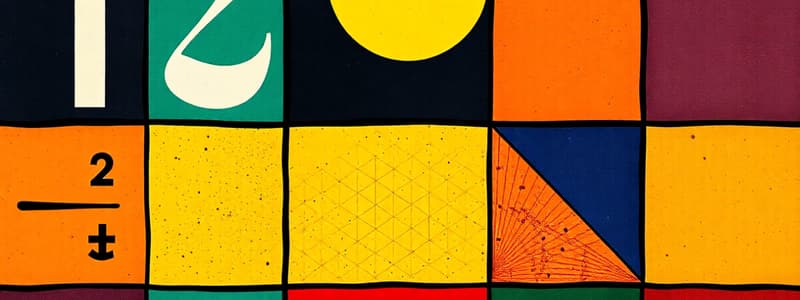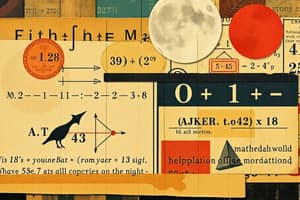Podcast
Questions and Answers
Which of the following is the most accurate definition of mathematics?
Which of the following is the most accurate definition of mathematics?
- The abstract science of number, quantity, and space. (correct)
- The art of persuasive writing.
- The study of opinions.
- The process of conducting experiments.
What are the fundamental operations involved in arithmetic?
What are the fundamental operations involved in arithmetic?
- Sine, cosine, tangent, and cotangent
- Hypothesis testing, confidence intervals, and regression
- Integration, differentiation, limits, and continuity
- Addition, subtraction, multiplication, and division (correct)
What is the purpose of using letters and symbols in algebra?
What is the purpose of using letters and symbols in algebra?
- To measure angles.
- To represent unknown numbers and quantities. (correct)
- To perform statistical analysis.
- To create geometric shapes.
Which field of mathematics deals with the properties of points, lines, and shapes?
Which field of mathematics deals with the properties of points, lines, and shapes?
What is the function of trigonometric functions like sine, cosine, and tangent?
What is the function of trigonometric functions like sine, cosine, and tangent?
Which area of mathematics deals with collections of objects?
Which area of mathematics deals with collections of objects?
What is calculus primarily used for?
What is calculus primarily used for?
What is the main focus of descriptive statistics?
What is the main focus of descriptive statistics?
What type of mathematics focuses on structures that are discrete rather than continuous?
What type of mathematics focuses on structures that are discrete rather than continuous?
Which branch of mathematics explores the properties and relationships of numbers, especially integers?
Which branch of mathematics explores the properties and relationships of numbers, especially integers?
Which mathematical field studies the properties of spaces that remain the same under continuous transformations?
Which mathematical field studies the properties of spaces that remain the same under continuous transformations?
What is the focus of numerical analysis?
What is the focus of numerical analysis?
Which field provides a framework for analyzing strategic interactions between rational decision-makers?
Which field provides a framework for analyzing strategic interactions between rational decision-makers?
What area of mathematics is concerned with the quantification, storage, and communication of information?
What area of mathematics is concerned with the quantification, storage, and communication of information?
Which area of mathematics is particularly relevant to cryptography?
Which area of mathematics is particularly relevant to cryptography?
What field examines systems that exhibit unpredictable behavior due to sensitivity to initial conditions?
What field examines systems that exhibit unpredictable behavior due to sensitivity to initial conditions?
Flashcards
Prime Numbers
Prime Numbers
Integers divisible only by 1 and themselves.
Divisibility
Divisibility
Whether a number can be divided evenly by another.
Congruences
Congruences
Numbers with the same remainder after division.
Sets
Sets
Signup and view all the flashcards
Union (Set Theory)
Union (Set Theory)
Signup and view all the flashcards
Intersection (Set Theory)
Intersection (Set Theory)
Signup and view all the flashcards
Complement (Set Theory)
Complement (Set Theory)
Signup and view all the flashcards
Numerical Analysis
Numerical Analysis
Signup and view all the flashcards
Mathematics
Mathematics
Signup and view all the flashcards
Arithmetic
Arithmetic
Signup and view all the flashcards
Algebra
Algebra
Signup and view all the flashcards
Geometry
Geometry
Signup and view all the flashcards
Trigonometry
Trigonometry
Signup and view all the flashcards
Calculus
Calculus
Signup and view all the flashcards
Statistics
Statistics
Signup and view all the flashcards
Number Theory
Number Theory
Signup and view all the flashcards
Study Notes
- Mathematics is the abstract science of number, quantity, and space
- Mathematics may be used as a tool for quantifying everything from personal finances to movements of celestial obhects
Arithmetic
- Arithmetic involves the fundamental operations of addition, subtraction, multiplication, and division
- Arithmetic is the foundaiton of mathematics, essential for calculations in algebra, calculus, and statistics
- The order of operaitons in arithmetic is typcially remembered by the acronym PEMDAS (Parentheses, Exponents, Multiplication and Division, Addition and Subtraction)
Algebra
- Algebra extends arithmetic by using letters and symbols to represent numbers and quantities in formulas and equations
- Algebraic equations can be used to solve for unknown variables, simplifying complex problems
- Key algebraic concepts include polynomials, factoring, and solving equations
Geometry
- Geometry is concerned with the properties and relations of points, lines, surfaces, solids, and higher dimensional analogs
- Euclidean geometry foucses on the geometric shapes and constructions that can be made on a flat plane, using tools such as compasses and straightedges
- Analytic geometry applies algebraic techniques to geometric problems, using coordinate systems to represent geometric shapes
Trigonometry
- Trigonometry explores the relationships between angles and sides of triangle
- Trigonometric functions like sine, cosine, and tangent are used to calculate unknown lengths or angles in triangles
- Trigonometry is used for calculations in navigation, physics, and engineering
Calculus
- Calculus is the study of continuous change
- Differential calculus concerns the rate of change of functions and the slopes of curves, throught the concept of derivatives
- Integral calculus is used to compute areas and volumes and to calculate the accumulation of quantities
- Calculus is applied in many fields including physics, engineering, economics, and computer science
Statistics
- Statitics is the collection, analysis, interpretation, and presentation of data
- Descriptive statitistics involves summarizing and presenting data, using measures such as mean, median, and mode
- Inferential statistics involves making inferences and predictions based on sample data, using techniques such as hypothesis testing and confidence intervals
- Statistics is used in science, business, and government for decision-making purposes
Number Theory
- Number theory is a branch of mathematics that deals with the properties and relationships of numbers, especially integers
- Prime numbers, divisibility, and congruences are core concepts in number theory
- Number theory has practical applications in cryptogrpahy and computer science
Set Theory
- Set theory is the study of sets, which are collections of objects
- Concepts like union, intersection, and complement are fundamental to set theory
- Set theory provides a foundation for other branches of mathematics and computer science
Topology
- Topology studies the properties of spaces that are preserved under continuous transformations
- Topological spaces are studied without regard to their exact shape or size, focusing instead on their connectedness and continuity
- Topology has applications in data analysis, physics, and computer science
Mathematical Logic
- Mathematical logic is the study of formal systems in mathematics
- Propositional logic and predicate logic are key areas within mathematical logic
- Mathematical logic is essential for computer science, especailly in areas such as artifical intelligence and formal verification
Discrete Mathematics
- Discrete mathematics deals with mathematical structures that are discrete rather than continuous
- Graph theory, combinatorics, and logic are areas of discrete mathematics
- Discrete mathematics is essential for computer science and computer engennering
Numerical Analysis
- Numerical analysis is concerned with developing and analyzing algorithms for solving mathematical problems
- Approximations and error analysis are key aspects of numerical analysis
- Numerical analysis is used in scientific computing and engineering
Game Theory
- Game theory is a mathhematical framework for analyzing strategic interactions between rational agents
- Concepts such as Nash equilibrium and game strategies are central to game theory
- Game theory is applied in economics, political science, and biology
Information Theory
- Information theory deals with the quantification, storage, and communication of information
- Entropy, data compression, and error-correcting codes are studied in information theory
- Information theory is essential for communication systems and data storage
Chaos Theory
- Chaos theory studies dynamical systems that are highly sensitive to initial conditions
- Chaotic systems exhibit unpredictable behavior despite being deterministic
- Chaos theory has applications in physics, meteorology, and economics
Studying That Suits You
Use AI to generate personalized quizzes and flashcards to suit your learning preferences.
Description
Explore the basics of mathematics, including arithmetic and algebra. Arithmetic involves addition, subtraction, multiplication, and division. Algebra uses symbols to represent numbers and solve equations.




